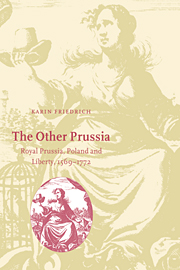Book contents
- Frontmatter
- Contents
- Preface
- Gazetteer
- Glossary
- List of abbreviations
- Map 1
- Map 2
- 1 Introduction
- 2 The origins of Royal Prussia
- 3 Royal Prussia and urban life in the Polish-Lithuanian Commonwealth
- 4 History, myth and historical identity
- 5 Political identity in the cities of Royal Prussia and the meaning of liberty (1650–1720)
- 6 Loyalty in times of war
- 7 Divergence: the construction of rival Prussian identities
- 8 Centre versus province: the Royal Prussian cities during the Great Northern War
- 9 Myths old and new: the Royal Prussian Enlightenment
- 10 Conclusion
- Bibliography
- Index
- CAMBRIDGE STUDIES IN EARLY MODERN HISTORY
1 - Introduction
Published online by Cambridge University Press: 22 September 2009
- Frontmatter
- Contents
- Preface
- Gazetteer
- Glossary
- List of abbreviations
- Map 1
- Map 2
- 1 Introduction
- 2 The origins of Royal Prussia
- 3 Royal Prussia and urban life in the Polish-Lithuanian Commonwealth
- 4 History, myth and historical identity
- 5 Political identity in the cities of Royal Prussia and the meaning of liberty (1650–1720)
- 6 Loyalty in times of war
- 7 Divergence: the construction of rival Prussian identities
- 8 Centre versus province: the Royal Prussian cities during the Great Northern War
- 9 Myths old and new: the Royal Prussian Enlightenment
- 10 Conclusion
- Bibliography
- Index
- CAMBRIDGE STUDIES IN EARLY MODERN HISTORY
Summary
The essence of a nation is that all individuals have a lot of things in common, but also that they have eliminated many things from their collective memory. Forgetting, and, I would say, historical error are an essential factor in the creation of a nation, and thus the advances of historical study are often threatening to a nationality.
In 1902, a curious masquerade took place at Marienburg Castle in West Prussia. Emperor William II, flanked by knights in medieval armour, entered this formidable fortress overlooking the plain of the Nogat and Vistula Delta. Among them were several members of the Order of the Hospital of St Mary of Jerusalem; others were ordinary Prussian soldiers dressed up as knights of the Teutonic Order, as this organisation was commonly called. It was a memorable moment: for over 450 years, no Teutonic Knight had set foot in the castle. Marienburg had been the seat of the grand masters of the Order from 1309 until 1457, when the Knights surrendered it to a Polish-Lithuanian army. In 1454 the noble and urban estates of Prussia rebelled against their Teutonic masters and accepted the king of Poland, Casimir Jagiellończyk, as their new overlord. The resultant war lasted thirteen years, ending in 1466, with the Second Peace of Thorn.
From 1455 there were two countries known by the name of Prussia.
- Type
- Chapter
- Information
- The Other PrussiaRoyal Prussia, Poland and Liberty, 1569–1772, pp. 1 - 19Publisher: Cambridge University PressPrint publication year: 2000
- 2
- Cited by



